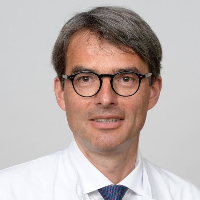
The program includes:
- Initial presentation in the clinic
- clinical history taking
- physical examination
- review of medical records
- laboratory tests:
- complete blood count
- general urine analysis
- biochemical analysis of blood
- TSH-basal, fT3, fT4
- tumor markers (AFP, CEA, СА-19-9)
- indicators of inflammation (CRP, ESR)
- indicators blood coagulation
- abdominal ultrasound
- gastroscopy with biopsy
- analysis of hp (helicobacter pylori)
- CT/MRI abdomen
- preoperative care
- partial resection of the stomach with anastomosis
- histologically and immunohistochemically
examination of the remote tissues - symptomatic treatment
- control examinations
- the cost of essential medicines and materials
- nursing services
- nutrition recommendations
- full hospital accommodation
- explanation of future recommendations
Service
You may also book:
 BookingHealth Price from:
BookingHealth Price from:
About the department
The Department of General and Abdominal Surgery, Colorectal Surgery, Hepatopancreatobiliary Surgery, Hernia Surgery and Bariatric Surgery at the Brothers of Mercy Hospital Munich provides the full range of surgical treatment in its field of competence. The department's highly qualified surgeons annually perform about 2,000 surgical interventions. Extensive clinical experience allows the specialists to perform even particularly complex operations. The department’s advanced operating rooms serve for surgery to treat gastrointestinal diseases, liver, gallbladder, bile duct, pancreatic, rectal, anal and colon pathologies. The medical facility also successfully performs operations to treat hernias: inguinal, umbilical, and anterior abdominal wall hernias. In addition, the department's doctors deal with the surgical treatment of morbid obesity. Minor traumatic laparoscopic interventions are considered the gold standard, which guarantee a patient minimal risks and rapid postoperative restoration. Surgeons tell the patient in detail about their upcoming treatment and, in every possible way, support them in their recovery. The department is headed by PD Dr. med. Johann Spatz.
The department's general and abdominal surgeons provide the surgical treatment of benign and malignant diseases of all abdominal organs, while the priority is on treating the digestive organs. The specialists most often deal with appendix removal, gallbladder operations, surgical treatment of diverticulitis, soft tissue tumor removal, and abscess drainage. Doctors have exceptional competence in the treatment of abdominal organs. The specialists also perform operations for emergency conditions: perforations of the gastrointestinal organs, intestinal invagination, internal bleeding, acute pancreatitis, etc.
Of particular interest in the field of colorectal surgery is the treatment of bowel and rectal cancer, which is carried out in the certified center of the German Cancer Society. The treatment regimen is usually determined during tumor boards with the participation of surgeons, oncologists, chemotherapists, radiation therapists and other specialists. The surgical resection of a malignant tumor is practically the basis of the treatment regimen in all clinical situations. In most cases, low-traumatic surgical techniques are used, which exclude high risks and severe pain. In addition, patients with metastatic cancer are offered specially developed multimodal treatment regimens.
The main area of work of hepatopancreatobiliary surgeons is operations for benign and malignant liver diseases, pancreas, bile ducts and gallbladder. Surgical treatment is performed using modern minimally invasive and hybrid techniques (combination of laparoscopic and open surgical techniques). In cooperation with specialists in interventional radiology, thermal ablation and embolization can be carried out for liver cancer treatment. The department has the German Cancer Society's certificate in treating liver cancer, which indicates the high competence of doctors and adherence to standards of modern surgery.
The department's surgeons often deal with hernias in their clinical practice. The specialists perform surgical treatment of inguinal, umbilical, and anterior abdominal wall hernias. To repair hernias, the department's surgeons resort to minimally invasive and classic open techniques. Whenever possible, preference is given to the most sparing type of treatment. Sometimes hernia surgery is carried out on an outpatient basis, under local anesthesia. The department's work in hernia repair surgery is marked by a quality certificate from the German Hernia Society. In addition, the surgeons in this area regularly exchange experience with their colleagues from the European Hernia Society, which contributes to achieving the best therapeutic results.
The department also offers bariatric surgery services. The surgeons of this profile perform operations for morbid obesity in patients who cannot get rid of excess weight with diet, physical exercises and drug therapy. Excess weight is not only an aesthetic problem, but also entails many health risks, including the development of diabetes mellitus, osteoarthritis, and obstructive sleep apnea. The department's bariatric surgeons specialize in sleeve gastroplasty, mini gastric bypass and Roux-en-Y gastric bypass. The interventions mentioned above are performed using minimally invasive methods. After surgery, the patient is supervised by nutritionists, physiotherapists and psychologists who develop an individual treatment plan to consolidate the results.
The department's surgical options include:
- General and abdominal surgery
- Emergency surgery
- Surgery for abdominal perforations, intestinal intussusception, and internal bleeding
- Surgery for bowel obstruction
- Surgery for appendicitis
- Surgery for acute cholecystitis
- Surgery for acute diverticular disease
- Elective surgery
- Surgery for gallstones
- Surgery for adhesions
- Surgery for inflammatory bowel disease (Crohn's disease and ulcerative colitis)
- Surgery for chronic diverticular disease
- Surgery for spleen diseases
- Surgery for thyroid diseases
- Surgery for stromal gastrointestinal tumors
- Surgery for tumors of the abdominal cavity and retroperitoneal space (for example, sarcomas)
- Surgery for abdominal wall tumors (for example, lipomas and atheromas)
- Emergency surgery
- Colorectal surgery
- Surgery for bowel cancer
- Surgery for rectal cancer
- Surgery for anal cancer
- Surgery for metastases in the liver and lungs caused by colorectal cancer
- Hepatopancreatobiliary surgery
- Surgical treatment of liver and bile duct pathologies
- Surgery for malignant liver tumors and liver metastases caused by other types of oncology
- Surgery for malignant tumors of the bile ducts and gallbladder cancer
- Surgery for benign liver tumors and liver cysts
- Surgery for cholecystitis, cholelithiasis and bile duct cysts
- Surgery for traumatic lesions and bleeding from the liver and bile ducts
- Surgical treatment of pancreatic pathologies
- Surgery for benign and malignant pancreatic tumors, including rare ones
- Surgery for chronic pancreatitis
- Surgery for pancreatic duct stenosis caused by cancer, for palliative purposes
- Surgical treatment of liver and bile duct pathologies
- Hernia surgery
- Surgery for inguinal hernia
- Open surgery: Shouldice technique and Lichtenstein operation
- Minimally invasive surgery: transabdominal preperitoneal hernia repair and totally extraperitoneal laparoscopic hernioplasty
- Surgery for umbilical hernias
- Open surgery: Mayo technique
- Minimum invasive operations: IPOM technique
- Surgery for anterior abdominal wall hernias
- Open surgery: Mayo technique
- Minimum invasive operations: IPOM technique
- Surgery for inguinal hernia
- Obesity surgery
- Sleeve gastroplasty
- Mini gastric bypass
- Roux-en-Y gastric bypass
- Other medical services
Curriculum vitae
PD Dr. med. Johann Spatz holds the position of the Head of the Department of General and Abdominal Surgery, Colorectal Surgery, Hepatopancreatobiliary Surgery, Hernia Surgery and Bariatric Surgery at the Brothers of Mercy Hospital Munich. Prior to that, the doctor held the position of a Senior Physician in the Department of General, Abdominal and Transplant Surgery. In July 2012, he had his habilitation and received his PD. This was followed by Venia legendi at Ludwig Maximilian University of Munich. The main focus of his clinical and scientific work is the improvement of the quality of care for patients with colon and rectal cancer.
The doctor devoted quite a lot of time to research at the Institute of Pathology under the supervision of Prof. Dr. Hans Arnholdt. Dr. Spatz (jointly with PD Dr. Bruno Märkl, Managing Senior Physician at the Institute of Pathology) received the Surgical Research Award 2012 for the results of his research activities within the Congress of German Surgeons. The German Society of Surgery together with the employees of the Department of General and Abdominal Surgery also noted the doctor's excellent research activities at the Maximum Care Hospital Augsburg.
Photo of the doctor: (c) Barmherzige Brüder Krankenhaus München
About hospital
According to the Focus magazine, the Brothers of Mercy Hospital Munich ranks among the top German hospitals in the Federal State of Bavaria!
The hospital is a modern medical facility with the highest level of medical care and long traditions. The hospital operates on the basis of the Technical University of Munich and the German Academy of Nutrition, which contributes to the introduction of progressive diagnostic techniques and therapeutic innovations into clinical practice. The history of the medical facility has more than 100 years, and throughout this time, the specialists of the hospital manage not only to keep abreast of the very latest advances in medicine, but also remain true to the principles of charity and human compassion.
With more than 1,100 employees, the department's competent medical team admits about 18,300 inpatients and more than 31,500 outpatients every year. The hospital employs about 200 specialized physicians who work for the benefit of their patients and provide them with the best quality of treatment, but, at the same time, pay due attention to the patient's emotional state, try to support him in every possible way, and tune him to a positive treatment outcome.
The hospital's main focuses include general and abdominal surgery, gastroenterology, hepatology, oncology, urology, cardiology and pulmonology, orthopedics and traumatology, palliative care, diagnostic and interventional radiology, and others. The hospital regularly demonstrates high treatment success rates in all areas of its specialization, thanks to which it has gained an excellent reputation not only in Germany, but also in the European medical arena.
Many hospital's departments are awarded with prestigious quality certificates, including the endoCert certificate in joint replacement surgery from the German Society for Orthopedics and Orthopedic Surgery (DGOOC), the certificate of the German Hernia Society (DHG), the certificate of the German Cardiac Society (DGK), the certificates of the German Cancer Society (DKG) in bowel and liver cancer treatment. Patients can be sure that they trust their health to the best professionals who successfully cope with clinical tasks of any complexity.
Photo: (с) depositphotos
Accommodation in hospital
Patients rooms
The patients of the Brothers of Mercy Hospital Munich live in comfortable, spacious single and double rooms with bright colors. The standard room furnishing includes an automatically adjustable bed, a bedside table, a wardrobe, a telephone, a TV and a radio. Single rooms also have a mini-fridge and a safe. There is also a table and chairs for receiving visitors. The hospital offers access to Wi-Fi. Each patient room has an ensuite bathroom with a shower and a toilet. The bathroom has a cosmetic mirror, a hair dryer and toiletries, towels, etc.
Meals and Menus
The patients of the hospital are offered healthy and tasty three meals a day: breakfast, lunch and dinner. The menu also features vegetarian dishes. If you do not eat all the food for any reason, you will be provided with an individual menu.
Further details
Standard rooms include:
Religion
There is a small chapel on the territory of the hospital, where worship is regularly held. The chapel is also open for independent visits and prayers.
Accompanying person
Your accompanying person may stay with you in your patient room or at the hotel of your choice during the inpatient program.
Hotel
You may stay at the hotel of your choice during the outpatient program. Our managers will support you for selecting the best option.





